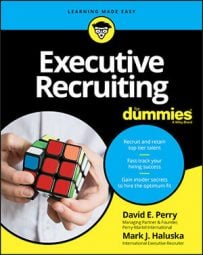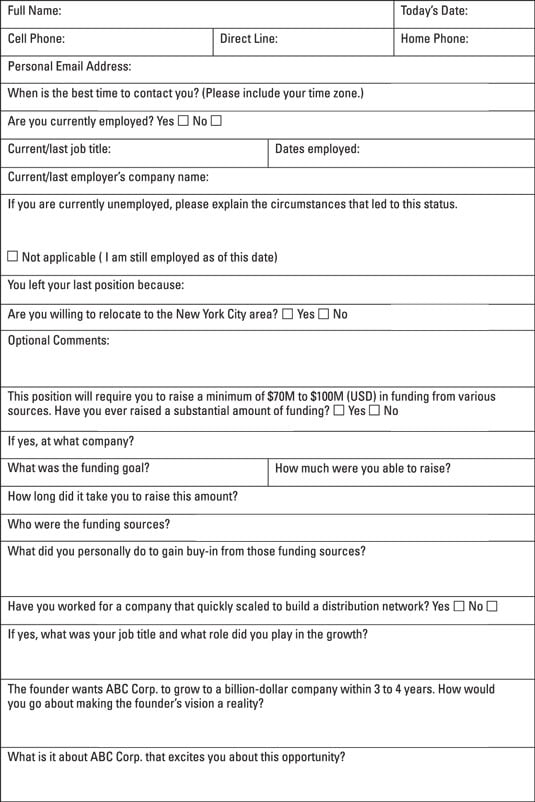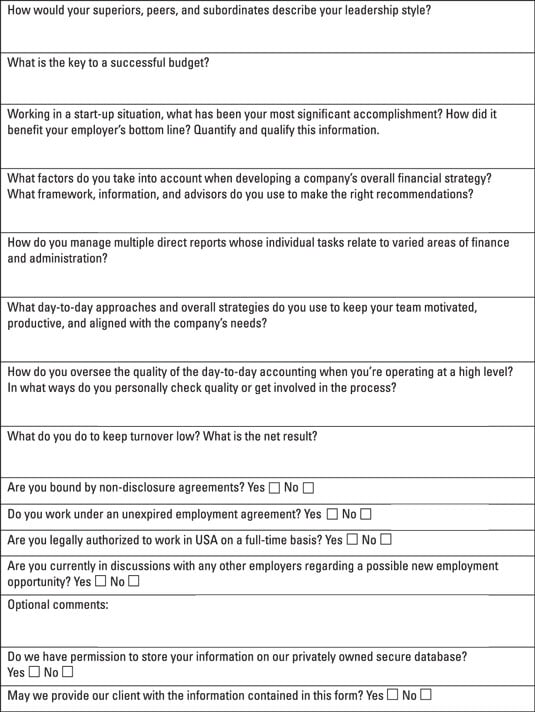The CCB also enables prospects to screen themselves into (or out of) the search, basically doing all the grunt work for you! As an added bonus, the process of generating the CCB leaves the prospect with the impression that the organization knows exactly what it's looking for to fill the position and, perhaps more important, is considerate of her time.
If the prospect isn't a good fit or decides not to proceed, at the very least, thanks to the CCB, you'll have left her with a great impression — which means she'll certainly take your calls in the future!
Building the form for a confidential candidate brief
The CCB form contains four main sections:- Contact information: Here, ask for the prospect's personal email address and his phone numbers (his direct line at work, his cellphone number, and his home phone number). Also ask what the best time to contact him during the day is.
- Current employment: In this section, ask for the candidate's current title and the dates of employment at his current organization. If he's left that position, ask why.
- Position-related questions: This is it — the meat of the CCB. This section features several questions designed to determine whether the prospect is a good fit for the role. The questions should derive from the information in the position profile. They should be easy to read, conversational, and presented in order of importance. They can be behavioral in nature — that is, they can ask the candidate to describe a time in the past when he displayed certain behaviors. (Think: "Tell me about a time when. . . .") Or, they might be situational, in which case the interviewer presents a problem or situation and asks the candidate how he would handle it. (Think: "What would you do if. . . .")
It's best to omit questions pertaining to personal interests. Ditto questions designed to gauge "fit." These will be addressed later, in a face-to-face interview.
- Questions of a legal nature: Here's where you dot your is and cross your ts, legally speaking. Specifically, you want to cover the following:
- The status of any noncompete agreements in effect
- The status of any nondisclosure agreements in effect
- Whether he has the legal right to work in the country where the position is located
- The status of any other current employment negotiations
- Permission to keep his file in your database, with a guarantee of privacy
- Permission to share his information with the search committee
The CCB form should be 100 percent fluff-free. Otherwise, you'll find that most executives — whose time is at a premium — will simply dismiss the exercise.
A sample confidential candidate brief for a CFO
To help you wrap your head around the whole CCB thing, here's a sample CCB form — in this case, for a CFO. Why a CFO? Because every company has one, and most CFO roles are pretty much the same regardless of company size, whether it's public or private, and irrespective of industry. Compared to, say, the CEO role, or the VP of sales or marketing, there's not much variation among CFO positions.Reviewing a confidential candidate brief
When the prospect returns the CCB form, you'll want to review his answers. Here's what you want to find out:- Are the candidate's answers relevant?
- Are they concise?
- Did the candidate spell-check his answers?
- Can the candidate communicate effectively in writing?
- How thoughtful were the candidate's answers?
- Do the candidate's answers make it seem like he was in a hurry to plow through the form, giving the questions little thought?
- Does it seem like the candidate cut and pasted his answers from another document? Or does it seem like he really tried to answer your questions?
- Did the candidate provide proprietary information that should have remained confidential?
If a candidate shares proprietary information, it's a huge red flag. In fact, it's so bad, it should automatically disqualify the candidate from consideration. After all, what's to stop him from sharing your proprietary information in the future?
The answers to these questions will give you a good idea of whether to proceed with this candidate.


